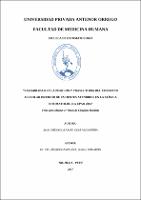Variabilidad en la posición y trayectoria del conducto alveolar inferior de pacientes atendidos en la Clínica Estomatológica UPAO 2016

Ver/
Descargar
(application/pdf: 564.7Kb)
(application/pdf: 564.7Kb)
Fecha
2017Autor(es)
Ordinola Arias, Gina Alexandra
Metadatos
Mostrar el registro completo del ítemResumen
El presente estudio tuvo como objetivo principal determinar la variabilidad en la
posición y trayectoria del conducto alveolar inferior de pacientes atendidos en la Clínica
Estomatológica UPAO 2016.
El estudio fue retrospectivo, transversal, descriptivo, observacional. La muestra fue de
32 tomografías en las que se evaluaron las 64 hemimandíbulas de pacientes mayores de
edad realizando cortes a nivel de 2da premolar, 1era molar y 2da molar. Se calcularon
promedios y varianzas y se utilizaron las pruebas estadísticas F de Fisher y t de student
donde se consideró un nivel de significancia de 5%.
Los resultados mostraron que no existe diferencia significativa en los valores obtenidos
en cuanto a cuadrante, sin embargo si la hay al comparar los resultados en cuanto a
sexo.
Se concluyó en que el conducto alveolar inferior muestra mayor proximidad a la tabla
vestibular a nivel de la 2da premolar y mayor proximidad a la tabla lingual, a nivel de la
2da molar y la distancia hacia el reborde basal es mayor a nivel de 2da premolar y 2da
molar y menor a nivel de 1era molar. The present study had as main objective to determine the variability in the position and
trajectory of the inferior alveolar duct of patients attended in The Stomatologic Clinic
UPAO 2016.
The study was retrospective, transverse, descriptive, observational.
The sample consisted of 32 tomographies in which the 64 hemimandibles of elderly
patients were evaluated, performing cuts at the level of 2nd premolar, 1st molar and 2nd
molar.
Averages and variances were calculated and Fisher's F and Student's T tests were used
where a significance level of 5% was considered.
The results showed that there is no significant difference in the values obtained in
quadrant, however if there is one when comparing the results in terms of sex.
It was concluded that the inferior alveolar duct shows greater proximity to the vestibular
table at the level of the 2nd premolar and greater proximity to the lingual table at the
level of the 2nd molar and the distance towards the basal flange is greater at the level of
2nd premolar and 2nd molar and lower at the 1st molar level.
Palabras clave
Colecciones
- Estomatología [653]

